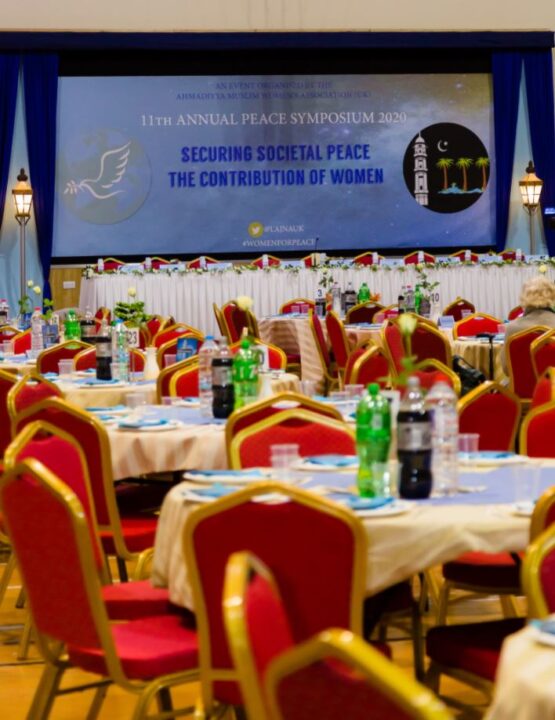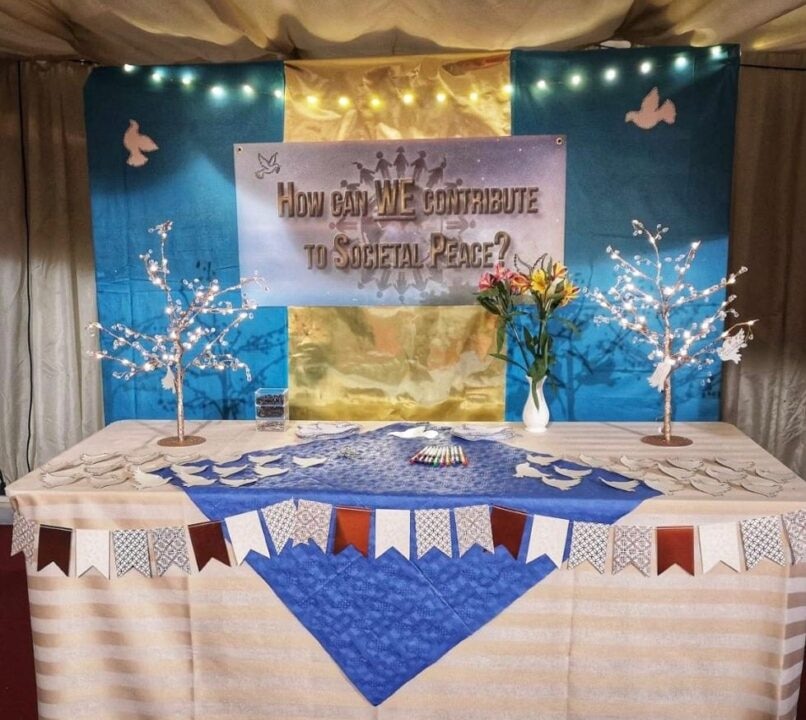Iffat Mirza, Lajna Imaillah UK

Lajna Imaillah UK hosted their 11th annual Peace Symposium on 25 January at Baitul Futuh Mosque, London. The symposium, with the grace of Allah, saw over 400 women from all walks of life convene to discuss and learn about the important role women have to play in establishing lasting peace across the globe.
The event was representative of women of all and no faiths and a wide range of professional and academic backgrounds. The aim of our Peace Symposium is to initiate the conversation of the responsibility of women in establishing peace. It has been noted in various studies and discourses, that sustainable peace can only be achieved with the involvement of women at its core. With four non-Ahmadi speakers and the keynote address delivered by Sadr Lajna UK, the event was a great success.
The evening began with a warm reception in the marquee where guests gathered and mingled, exploring the wide-ranging exhibitions on many departments of the Jamaat, such as The Review of Religions, the translations of the Holy Quran, as well as an exhibition on the status of women in Islam and in particular, the concept of the hijab. This also gave guests an opportunity to tour the mosque and witness its numerous beauties as well as to take part in the Al-Qalam project. After the reception and tours, the guests assembled in Tahir Hall for the speeches.
The speakers included Karen Sanders, Professor of Politics and Communications at St Mary’s University in London, who was followed by Alice Coulibaly, an international programmes officer at Peace Direct, an award-winning, international NGO. We then had the pleasure of hearing Lieutenant Commander Suzanne Lynch of the Royal Navy, and then we had Shoshana Clark, the CEO of Turquoise Mountain.
Professor Karen Sanders made some very pertinent points on the need to work on our communication skills as a prerequisite to achieving societal peace. She highlighted that coding and decoding and spoken language, body language, tone and empathy are key to communication. Taking the trouble to learn a culture’s code shows respect and this is the basis for communication which arises from a true desire to understand and accept one another.

Alice Coulibaly described first-hand experience of women mediating between groups to resolve conflict. These are often women who are victims of conflict and have begun to lead the way.
She described how, when women are involved in the peace process between two communities, the accords are longer lasting; and when women are excluded from the peace process, war often returns.
Lieutenant Commander Suzanne Lynch spoke about the unique qualities that only women can bring to peace talks. She stated that women add different values, different communication skills and different forms of empathy during times of conflict and are able to bridge divides that male colleagues are unable to. Whether protecting world food programme vessels or fighting piracy off the coast of Somalia, women can be less confrontational and can get the job done efficiently.
Also speaking from personal experience, Shoshana Clark introduced the work of the charity in rebuilding the Old City of Kabul and saving the traditional craft industry. Using Samira, a young Afghan woman as a case study, Shoshana demonstrated that women can drive economic growth and can be ambassadors and artisans, fomenting a sense of collective pride which is necessary to achieve lasting peace.
Finally, the keynote address was delivered by Sadr Lajna UK, Dr Fariha Khan Sahiba, who gave an insightful view into the Islamic perspective on the vital necessity of peace at all levels of society, whether governmental or domestic. She reminded all attendees that justice, opportunity, knowledge, understanding, tolerance and peace at home are all important to establish peace at a wider level. In Islam, great emphasis is laid on peace at home as the building block of all societies. Women can be the architects of peace in the home, and this is no easy task. She narrated the beautiful hadith, “Paradise lies under the feet of your mother”, highlighting the responsibility of mothers to create peace for children.
Sadr Sahiba also touched upon education as essential in establishing peace and counteracting acts of aggression. She mentioned that Islam has encouraged the acquiring of knowledge especially for women. Guests were greatly impressed to learn that the literacy rate of Ahmadi girls in developing countries is at 99 percent.
Quoting Hazrat Khalifatul Masih V, may Allah be his Helper, Sadr Lajna said:
“…Islam established the rights of women and girls for the first time. At a time when women and girls were discriminated against and looked down upon, the Holy Prophetsa of Islam instructed his followers to educate and respect girls. A path to heaven was through educating and instilling moral values in girls.’’
By the immense grace of Allah the Almighty, the feedback from guests was highly positive and encouraging, with many women eager to learn more about Islam and its views, not only on peace but also on the status that women are granted.

